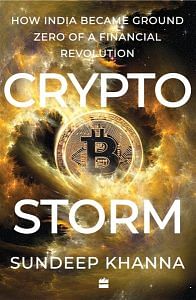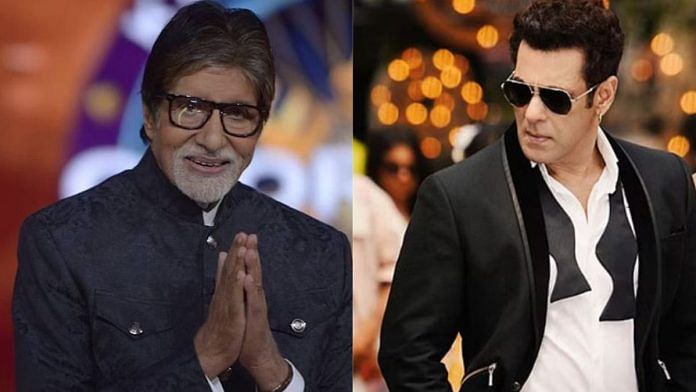In India, NFT newbies needed no such pedigree or experience. As word spread that there was money to be made, a number of celebrities seized upon the opportunity created for them by agents and companies ready with the infrastructure needed to organize the auctions.
Bollywood superstars Amitabh Bachchan and Salman Khan were among those who were first off the mark. They launched their own NFTs for auctioning to their fans. Bachchan, who signed up with the NFT marketplace beyondlife.club, made more than Rs 7 crore from the sale of various objects, including autographed posters from his films, and a recording in his own voice of his father Harivansh Rai Bachchan’s famous poem ‘Madhushala’. Salman Khan partnered with an Indian start-up cryptocurrency bollycoin, which has been trying to develop an NFT marketplace for all sorts of Bollywood-related content. The project was backed by Khan and his brother’s production houses, and Reel Life Productions, which has produced two of Khan’s films—Bharat in 2019 and Radhe: Your Most Wanted Bhai in 2021.
Meanwhile, another similar marketplace, SocialSwag, put out NFTs produced for the movie 83, which celebrates underdog India’s unexpected victory at the 1983 Cricket World Cup in England under Kapil Dev. The NFTs, which are listed on the site https://nft.socialswag.com/buy-now, can be purchased using various cryptocurrencies. The digital avatar of Ranveer Singh and Deepika Padukone, who played Kapil and his wife Romi in the movie, is listed at a price of Rs 4,999. Its description on the site says: ‘This digital avatar for the Taste of Success Collection was created in collaboration with notable Indian artists Vidushi and Medhavini Yadav, Master of Design graduates from IIT-B, whose artwork has sold for hundreds of thousands of dollars. They are world-renowned for their work with international women’s rights organizations, ranging from the United Nations to Oxfam. They’re supported by animator Ashwin Vasudevan and sound artist Anupama Thakur, both highly sought-after in the Indian film industry.’
As an incentive, it adds that holders of this NFT would be eligible for a free airdrop of an NFT in the next collection on SocialSwag.
The marketplace announced in January that the auction of collectibles related to the movie 83 had sold out for Rs 10 lakh within an hour of their debut on the platform. With most of the collectibles, including that of P.R. Man Singh, the manager of that team, listed at Rs 4,999, it makes for a total of just two hundred items sold. Months later, dozens of items are still available for purchase on the site, so it is difficult to conclude how successful the whole exercise was.
By contrast, some of the others have been more successful. Top fashion designer Manish Malhotra sold NFTs of digital sketches of some of his most famous dresses for $4,000 apiece. Actors Kamal Haasan, Rajinikanth and Sunny Leone as well as the singer Sonu Nigam too joined the rush of leading artistes whose movie and song NFTs were released.
Innocuous as they appear, NFTs have had their share of controversies across the world. Much drama surrounded film-maker Quentin Tarantino’s attempts to sell an NFT of the original handwritten screenplay from his film Pulp Fiction, split into several iconic scenes, each as a one-of-a-kind NFT. The scripts also came with audio commentary from Tarantino himself explaining the scene’s significance. Fascinating as the project was, there was a problem. Miramax, the producers of the iconic film, filed a lawsuit claiming intellectual property rights over all the content. In a statement its lawyers put out, the film studio claimed: ‘Whatever limited rights Mr Tarantino has to screenplay publication, they do not permit the minting of unique NFTs associated with Miramax’s intellectual property, and his contrary position is the subject of a pending lawsuit.’ Despite this, the first of seven NFTs called ‘Royale with Cheese’, was bought for $1.1 million by a crypto collective AnonDAO. The fate of the other six NFTs isn’t clear.
Such rights-related controversies apart, there has also been a widespread problem of fakes. In January 2022, OpenSea, one of the largest NFT marketplaces in the world, revealed that 80 per cent of all NFTs minted on its free minting tool, were fake or plagiarized. Not surprisingly, a Twitter handle that’s dedicated to NFT-related plagiarism and thefts had over 15,000 followers in just the five months since it came up.
What’s more, NFTs have been rejected as naked cash grabs by gamers and musicians, the very communities they were expected to represent most strongly. Ever since artist Mike Winkelmann, also known as Beeple, sold a digital collage for $69.3 million, these one-of-a-kind cryptos were touted as the safest route for up-and-coming artists both to get into the limelight and earn some money as well. But soon the difficulty of asserting intellectual property rights for such NFTs led to a pushback from many artists. French-Canadian designer, illustrator and comic artist G.C. Houle summed it up when he tweeted:
‘Not: non-fungible
Hot: fungus’
Indeed, by the first week of May 2022, the NFT party seemed to be coming to a close. According to data website Nonfungible, sales had fallen to a daily average of about 19,000 that week, a 92 per cent decline from a peak of about 225,000 in September 2021. Active wallets fell 88 per cent that same week to about 14,000 from a high of 119,000 in November 2021.
Not that it stopped the tide of celebrities touting the value of cryptocurrencies. In January 2022, chess grandmaster Garry Kasparov, speaking with CoinDesk, hailed digital assets as the future, and said he would not be surprised if cryptocurrencies had replaced the dollar in ten years’ time. Kasparov, arguably the greatest chess player in history, said that he believed cryptocurrencies such as bitcoin are ‘digital gold’ and can hold their value as inflation rises.
Pertinently, Kasparov, who chairs the Human Rights Foundation and in 2017, founded the Renew Democracy Initiative (RDI), spoke about how cryptocurrencies were a good tool for people to fight back against what he saw as government overspending, which is leading to strong inflation that erodes the value of assets. Kasparov also endorsed NFT tokens, and in partnership with 1Kind, released a series of thirty-two NFTs, showcasing iconic moments from his life, including the 1985 win against Anatoly Karpov that made him the youngest world chess champion.
 This excerpt from Sundeep Khanna’s ‘Crypto Storm’ has been published with permission from HarperCollins India.
This excerpt from Sundeep Khanna’s ‘Crypto Storm’ has been published with permission from HarperCollins India.



